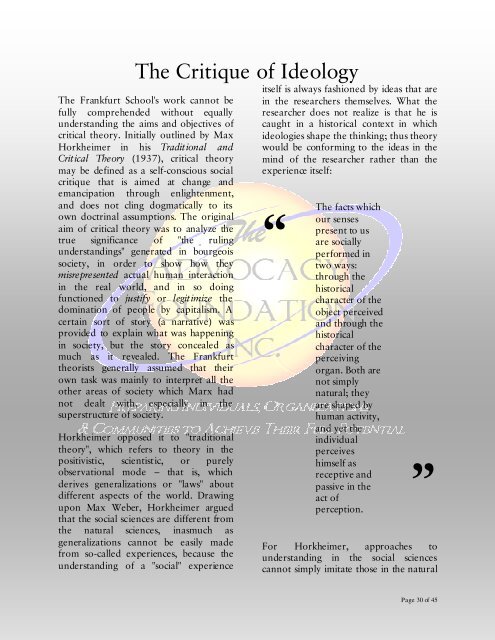Critical Thinking for Transformative Justice
Critical Thinking for Transformative Justice
Critical Thinking for Transformative Justice
Create successful ePaper yourself
Turn your PDF publications into a flip-book with our unique Google optimized e-Paper software.
The Critique of Ideology<br />
The Frankfurt School's work cannot be<br />
fully comprehended without equally<br />
understanding the aims and objectives of<br />
critical theory. Initially outlined by Max<br />
Horkheimer in his Traditional and<br />
<strong>Critical</strong> Theory (1937), critical theory<br />
may be defined as a self-conscious social<br />
critique that is aimed at change and<br />
emancipation through enlightenment,<br />
and does not cling dogmatically to its<br />
own doctrinal assumptions. The original<br />
aim of critical theory was to analyze the<br />
true significance of "the ruling<br />
understandings" generated in bourgeois<br />
society, in order to show how they<br />
misrepresented actual human interaction<br />
in the real world, and in so doing<br />
functioned to justify or legitimize the<br />
domination of people by capitalism. A<br />
certain sort of story (a narrative) was<br />
provided to explain what was happening<br />
in society, but the story concealed as<br />
much as it revealed. The Frankfurt<br />
theorists generally assumed that their<br />
own task was mainly to interpret all the<br />
other areas of society which Marx had<br />
not dealt with, especially in the<br />
superstructure of society.<br />
Horkheimer opposed it to "traditional<br />
theory", which refers to theory in the<br />
positivistic, scientistic, or purely<br />
observational mode – that is, which<br />
derives generalizations or "laws" about<br />
different aspects of the world. Drawing<br />
upon Max Weber, Horkheimer argued<br />
that the social sciences are different from<br />
the natural sciences, inasmuch as<br />
generalizations cannot be easily made<br />
from so-called experiences, because the<br />
understanding of a "social" experience<br />
itself is always fashioned by ideas that are<br />
in the researchers themselves. What the<br />
researcher does not realize is that he is<br />
caught in a historical context in which<br />
ideologies shape the thinking; thus theory<br />
would be con<strong>for</strong>ming to the ideas in the<br />
mind of the researcher rather than the<br />
experience itself:<br />
“<br />
The<br />
facts which<br />
our senses<br />
present to us<br />
are socially<br />
per<strong>for</strong>med in<br />
two ways:<br />
through the<br />
historical<br />
character of the<br />
object perceived<br />
and through the<br />
historical<br />
character of the<br />
perceiving<br />
organ. Both are<br />
not simply<br />
natural; they<br />
are shaped by<br />
human activity,<br />
and yet the<br />
individual<br />
perceives<br />
himself as<br />
receptive and<br />
passive in the<br />
act of<br />
perception.<br />
”<br />
For Horkheimer, approaches to<br />
understanding in the social sciences<br />
cannot simply imitate those in the natural<br />
Page 30 of 45

















